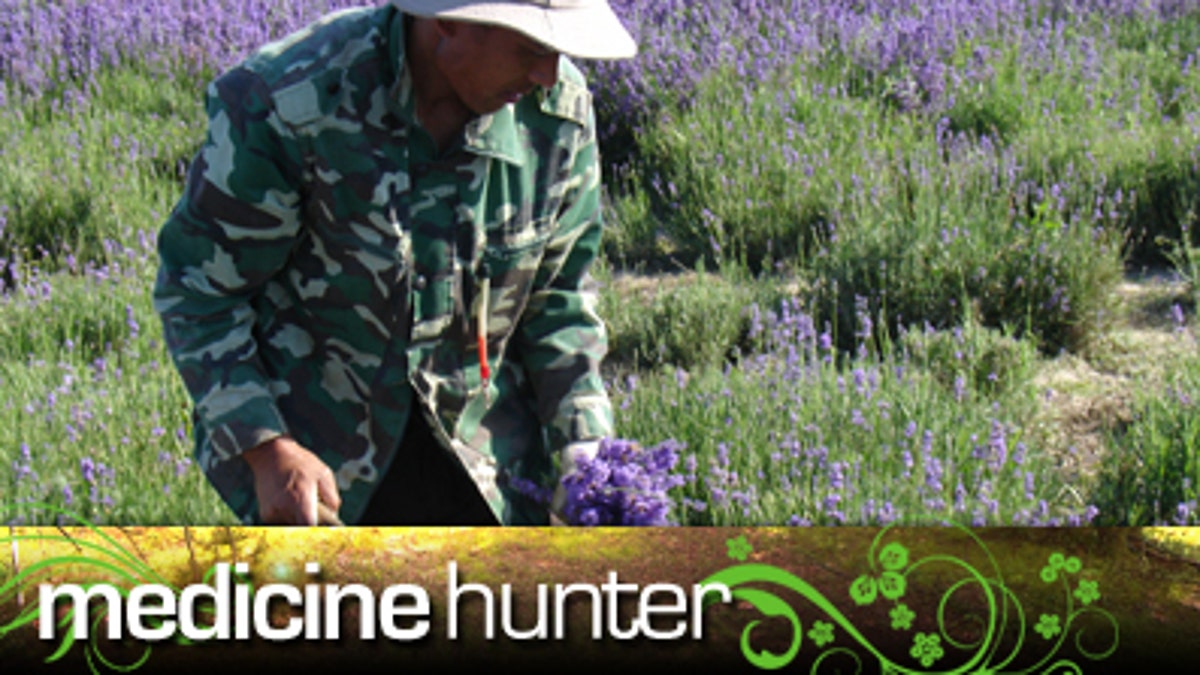
Sometimes, big surprises come from well-known plants.
Case in point? A recent study shows that breathing the aroma of lavender oil can reduce the stress and pain caused by inserting needles into skin.
The study, reported in the September 17 edition of the Journal of Alternative and Complementary Medicine, tested 30 volunteers. Prior to use of lavender oil, all subjects demonstrated similar pain when needles were inserted into their skin. But the group that breathed lavender oil prior to the second half of the experiment showed decreased bispectral index values and less pain from insertion of needles. Bispectral index values assesses depth of anaesthesia using sophisticated monitoring technology. The conclusion of the researchers in the study was that lavender oil significantly aided patients with pain. Thus the use of lavender as a medicine of high value continues through time.
Native to the mountains of the Mediterranean basin, lavender (Lavandula angustifolia) is cultivated widely throughout Europe, the U.S. and Australia. The oil is widely used in toiletries, cosmetics and colognes, and is a mainstay of aromatherapy. The plant and its preparations were used as an antiseptic in Greek, Roman and Arabian medicines. In fact, the name lavender derives from the Latin “lavar,” to wash. In ancient Egypt lavender was used in cosmetics and for embalming. Early Romans used lavender to scent baths. In households lavender was strewn upon floors to make a room fragrant. King Charles VI of France required a lavender pillow wherever he slept. Lavender was also used by grave robbers to ward off the black plague. In Tibetan Buddhist medicine, lavender is used to treat psychosis. Known for its calming and sedative properties, lavender oil is sometimes sprinkled onto a pillow to induce calm and sleep.
Dr. James Duke, in his best-selling book The Green Pharmacy, recommends regarding lavender in cases of amenorrhea (loss of menstruation), burns, carpal tunnel syndrome, insomnia, pain, psoriasis, and vaginitis. In Germany, the Commission E, which regulates herbal remedies, supports the use of lavender for restlessness, insomnia, and nervous stomach and intestinal complaints.
Lavender plants are popular in gardens, and hardy lavender plants make colorful purple hedges. When lavender is in bloom, the sweet and soothing aroma is a welcome delight. Often lavender is put into a large still for the making of essential oil. This oil comprises up to three percent of the total volume of the plant.
Lavender oil is used in perfumery, in toiletries and cosmetics, and plain for topical and atmospheric uses. Small lavender pillows are given to guests in some parts of the world to help induce calm sleep. Lavender oil is sometimes dropped onto pillows for the same purpose. A bit of lavender oil in an aromatherapy diffuser can create a peaceful atmosphere in a room, and helps to promote relaxation and calm.
Lavender contains a group of aromatic compounds including linalyl acetate, linalool, cineol, camphor, limonene, and several others. In animal studies, oil of lavender has produced a calming effect upon the nervous system, while in human studies lavender oil in a bath demonstrates value for the treatment of perineal discomfort. Lavender oil has been cited in the Journal of The National Cancer Institute as a possible substitute for the chemotherapeutic drug Tamoxifen. More research is needed on this.
Lavender, a widely cultivated fragrant plant used since antiquity both as a medicine and as a garden ornamental, shows continued value to this day. A love of lavender keeps its use high in common household products. And a curiosity about this fragrant blossoming plant keeps it in the science spotlight, where it continues to demonstrate a variety of benefits, including pain relief.
Chris Kilham is a medicine hunter who researches natural remedies all over the world, from the Amazon to Siberia. He teaches ethnobotany at the University of Massachusetts Amherst, where he is Explorer In Residence. Chris advises herbal, cosmetic and pharmaceutical companies and is a regular guest on radio and TV programs worldwide. His field research is largely sponsored by Naturex of Avignon, France. Read more at www.MedicineHunter.com
